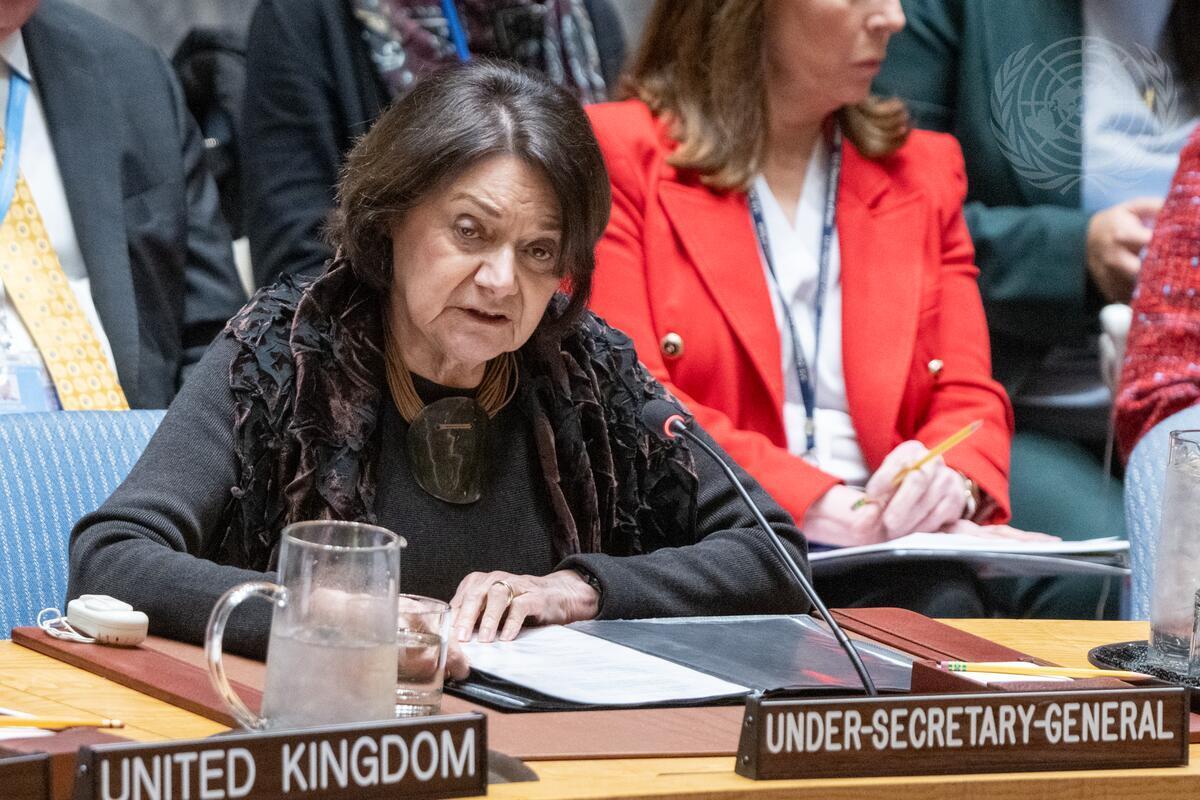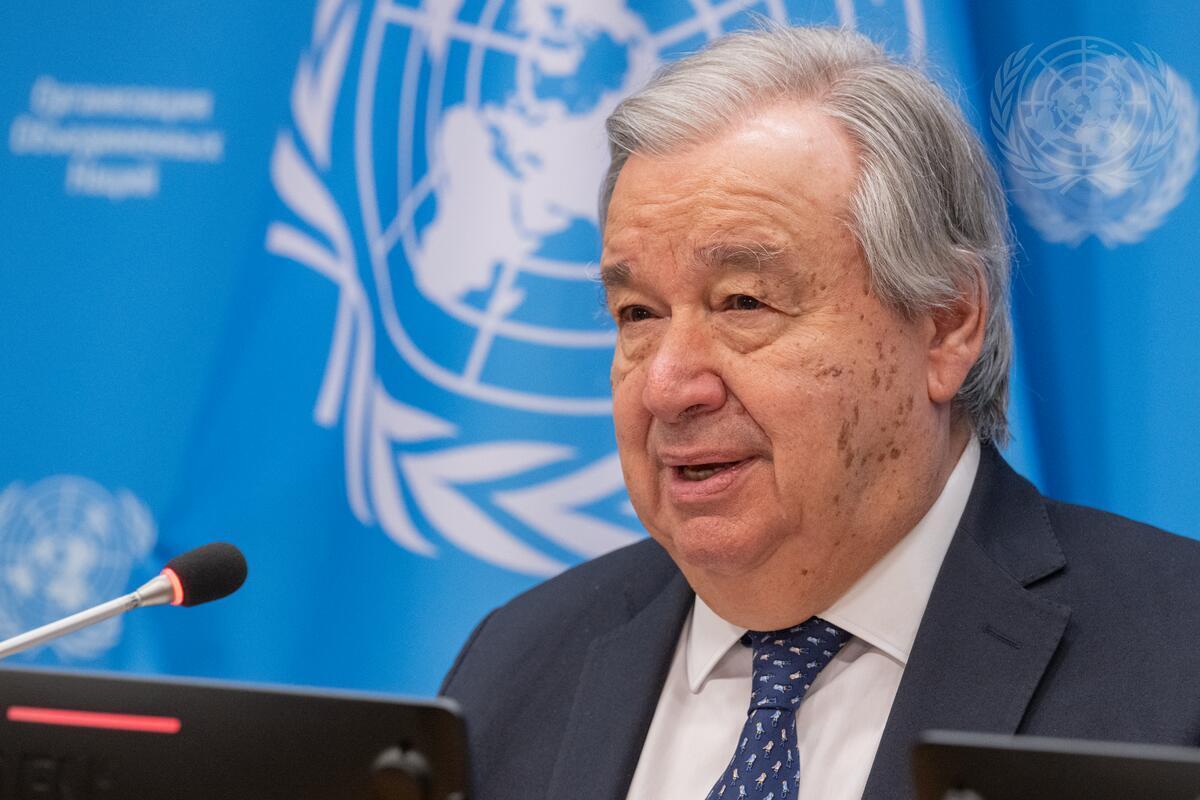Mister President,
Members of the Security Council,
Allow me to begin by wishing all Muslims of the world a blessed Ramadan.
I brief you today as Palestinians and Israelis are immersed in consequential political and electoral processes. Preparations continue for the Palestinian Legislative Council elections, scheduled for 22 May, while Israelis are engaged in efforts to form a governing coalition after the elections held on 23 March.
These developments may have significant implications for the prospects for advancing peace in the months ahead.
The holding of credible elections in Palestine is a crucial step towards renewing the legitimacy of national institutions and reestablishing Palestinian national unity. I encourage international support to these efforts.
The UN has engaged regularly with the Palestinian parties and the Central Elections Commission (CEC) to facilitate preparations for the elections and will continue its support for the election process. To date, the CEC has performed its duties with professionalism and integrity, enhancing trust in the electoral process. In particular, I welcome the CEC’s efforts to plan for and implement special measures to ensure safe voting in the context of the COVID-19 pandemic. I also underscore the critical role of election observers to ensure respect for the results of a credible and transparent process.
Mister President,
The candidate registration period concluded on 31 March. On 6 April, the CEC announced that all 36 registered electoral lists were approved. On 11 April, the CEC announced that of the 231 objections submitted to the CEC against registered candidates, 226 had been rejected, four withdrawn and one accepted. The Electoral Court upheld CEC decisions on 18 appeals brought before the Court. This concludes the legal process to challenge electoral lists. Final lists are expected to be published on 30 April, the start of the official campaign period.
I emphasize that any disputes should be resolved in a peaceful manner and through official legal mechanisms.
All sides must provide for and protect the right of Palestinians across the occupied West Bank, including East Jerusalem, and Gaza to participate in credible and inclusive Palestinian elections, as well as to stand for elections, free from intimidation. In particular, I urge all parties to refrain from any arrest, detention or interrogation based on freedom of opinion, freedom of expression or freedom of association.
Mister President,
The COVID-19 pandemic continues to pose a formidable threat throughout the OPT. I am seriously concerned by the significant rise in active cases in Gaza where the daily infection rate is reaching its highest level since the onset of the pandemic. In the West Bank, many hospitals remain at or near full capacity. My colleague from OCHA will brief after me and will provide greater detail on this situation.
As the socio-economic impact of the pandemic has significantly exacerbated a seemingly never-ending fiscal and economic crisis in both the West Bank and Gaza, support for the Palestinian Government’s response must continue to be a priority.
The Palestinian Government vaccination campaign, which officially began in the West Bank and Gaza last month, continued throughout the reporting period. The Palestinian Ministry of Health has received over 300,000 vaccine doses to date. Israel has continued its efforts to vaccinate segments of the Palestinian population in the West Bank, including in East Jerusalem, as well as over 100,000 Palestinians holding permits to enter Israel.
I welcome all efforts carried out thus far to vaccinate the Palestinian population, but the process needs to be accelerated and more vaccines are needed.
Mister President,
In a positive development, on 7 April, the United States announced plans to restart its economic, humanitarian, development and security assistance to Palestinians, including some USD 150 million in funding for UNRWA.
I welcome the resumption of US support, including to UNRWA. I appeal to all Member States to remobilize support to UNWRA, whose services are not only a lifeline for millions of Palestine refugees but are also critical for stability throughout the region. Funding the UN response is the fastest and most efficient way to address urgent needs in the OPT.
Mister President,
On 5 April, the Palestinian Government adopted the second National Action Plan on the implementation of Security Council Resolution 1325. I welcome the efforts of the Government to translate international frameworks into commitments and actions. I reiterate UN support for the implementation of the Women, Peace and Security Agenda in Palestine.
Mister President,
The demolition and seizure of Palestinian property throughout the occupied West Bank, including East Jerusalem continued during the reporting period. OCHA will provide details on relevant developments shortly. But allow me to reiterate my call upon Israel to cease this practice, in line with its obligations under international law, and to allow Palestinians to develop their communities.
Mister President,
On the basis of an Israeli law, passed in 1994, which bars activity in Jerusalem by the Palestinian Authority without prior approval, on 6 April, ISF shut down a meeting related to Palestinian elections at the Ambassador Hotel in East Jerusalem, calling in for questioning the hotel manager as well as the director of the Fatah office in Jerusalem.
Mister President,
Daily violence also continued throughout the OPT.
In Gaza, on 24 March, Israel Defense Forces fired some ten missiles at what it said were Hamas targets, in retaliation for a rocket fired towards Israel the previous day. On 15 and 16 April militants in Gaza fired two rockets towards Israel. The rockets landed in open fields, causing no damage or injury. In retaliation for each incident, IDF fired at what it said were Hamas-linked targets in the Strip. No injuries were reported.
In the occupied West Bank, including East Jerusalem, clashes, attacks, search and arrest operations, and other incidents resulted in the death of one Palestinian, and injuries to 29 Palestinians, including five children and one woman. Eight Israelis, including one woman, were injured in the course of these events.
Since the beginning of Ramadan, there have been repeated clashes between Palestinians and ISF and Israeli civilians in and around Jerusalem’s Old City, leading to injuries and arrests. I call on all sides to take steps to de-escalate tensions and maintain calm.
On 6 April, Israeli security forces (ISF) shot and killed a 45-year old Palestinian man at a checkpoint set up during an ISF operation in Bir Nabala village, north of Jerusalem. The man died of his injuries and his 35-year old wife, also in the vehicle, was injured. ISF initially said that the man had attempted a ramming attack, an account disputed by the man’s wife and eyewitnesses. ISF opened an investigation into the incident.
Meanwhile, settlers and other Israeli civilians perpetrated some 20 attacks against Palestinians, resulting in eight injuries and damage to property. Palestinians perpetrated some 20 attacks against Israeli settlers and other civilians in the West Bank, resulting in seven injuries and damage to property.
I underscore that all perpetrators of violence must be held accountable and swiftly brought to justice. I reiterate that Israeli security forces must exercise maximum restraint and may use lethal force only when strictly unavoidable in order to protect life. Particular care should be taken to protect children from any form of violence. In addition, the indiscriminate launching of rockets towards Israeli population centers violates international law and must stop immediately.
Mister President,
Turning to the region, on the Golan, the ceasefire between Israel and Syria has been generally maintained despite the continued violations of the 1974 Disengagement of Forces Agreement by the parties, leading to increasing tensions. UNDOF continues to liaise with both parties to remind them of their obligation to respect the terms of the Disengagement Agreement and prevent escalation of the situation across the ceasefire line.
In Lebanon, a new government has still not been formed, delaying implementation of crucial reforms and related international support, which are urgently needed to address the ever-worsening socio-economic situation and growing humanitarian needs.
In the UNIFIL area of operations the situation remained tense, including due to incidents of weapons pointing between the Israel Defense Forces and Lebanese Armed Forces across the Blue Line. UNIFIL remains engaged with the parties to contain incidents and defuse tensions, including through its liaison and coordination efforts and robust presence on the ground.
Mr. President,
In closing, I wish to emphasize that expectations for the holding of elections in Palestine are high and come after a long wait of almost fifteen years. Since my last briefing, a growing number of young people are expected to participate in shaping their political future and having the opportunity to vote for the first time.
In recent interviews conducted by UN Women with youth in Gaza and the West Bank, one young woman, whose view was not unique, said the following: “Although I am not into politics, I am a member of this society and want to have a voice. Even if those I vote for do not win, at least I will have exercised my right to vote.”
The successful completion of inclusive Palestinian elections is a critical step toward renewing democratic legitimacy of the Palestinian Government. These elections should also pave the way to uniting Gaza and the West Bank under a single, legitimate national authority, which would be an important step towards reconciliation and could advance Middle East peace.
The path forward will not be easy and will require political courage from all sides. Despite the myriad challenges, we remain focused on the goal of advancing a two-State solution – an independent, viable and sovereign Palestinian State living side-by-side with Israel in peace and security – in line with UN resolutions, international law and previous agreements.
It is crucial that the international community, and particularly the Middle East Quartet, signal a way forward towards an end to occupation and the achievement of a sustainable peace. This includes creating a clear political horizon and encouraging practical steps by all sides to set the stage for a successful return to negotiations.
The United Nations remains committed to working, through the Quartet and with other regional and international partners, to support Israelis and Palestinians in these efforts.
I thank you.






